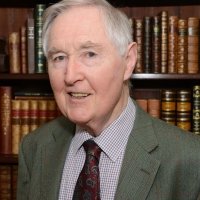POSTPONED - Gorbachev, Reagan, and Thatcher: How Their Relationship Mattered and Why the Cold War Ended When it Did
This event has been postponed. Please check back on our website late for a rescheduled date.
Archie Brown rejects the popular view that American military or economic superiority forced the Soviet Union to admit defeat in the Cold War. Political leadership, he argues, was of decisive significance, particularly Gorbachev’s emergence, which was not a product of US policy. The unexpected triangular relationship of Gorbachev, Ronald Reagan and Margaret Thatcher produced changing perceptions on all sides, with Thatcher surprisingly influential, given the disparity between British military power and that of the USA and USSR.
Archie Brown is Emeritus Professor of Politics at Oxford University and an Emeritus Fellow of St Antony’s College, Oxford. He was elected a Fellow of the British Academy in 1991 and he has been an International Honorary Member of the American Academy of Arts and Sciences since 2003. He taught at Glasgow University between 1964 and 1971 and at Oxford, where he was Professor of Politics, from 1971 to 2005. He has been a Visiting Professor of Political Science at Yale, Columbia University and the University of Texas at Austin. His latest book, The Human Factor: Gorbachev, Reagan, and Thatcher, and the End of the Cold War is published by Oxford University Press in New York on 1 April 2020. The book prior to that, The Myth of the Strong Leader: Political Leadership in the Modern Age, was named by Bill Gates as one of the four best books he read in 2016. Two of Archie Brown’s earlier works, The Gorbachev Factor (1996) and The Rise and Fall of Communism (2009; paperback, 2011) won the W.J.M. Mackenzie Prize of the Political Studies Association of the UK for best politics book of the year.
The Washington History Seminar is co-chaired by Eric Arnesen (George Washington University) and Christian Ostermann (Woodrow Wilson Center) and is sponsored jointly by the National History Center of the American Historical Association and the Wilson Center's History and Public Policy Program. It meets weekly during the academic year. The seminar thanks the Lepage Center for History in the Public Interest and the George Washington University History Department for their support.
Speaker

Moderators


Professor of History, The George Washington University. Director, National History Center of the American Historical Association.
Hosted By

History and Public Policy Program
A leader in making key foreign policy records accessible and fostering informed scholarship, analysis, and discussion on international affairs, past and present. Read more


Cold War International History Project
The Cold War International History Project supports the full and prompt release of historical materials by governments on all sides of the Cold War. Read more
